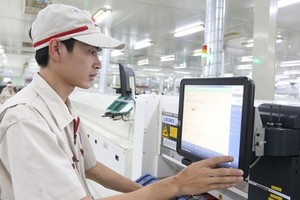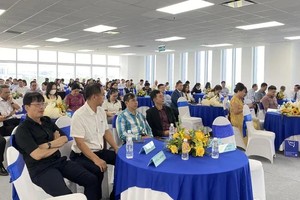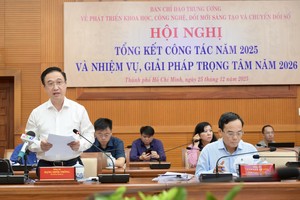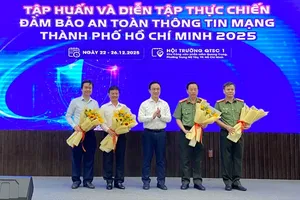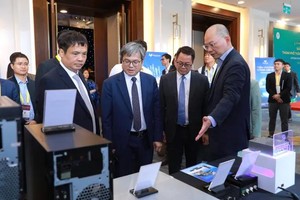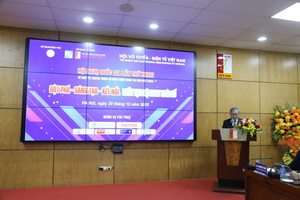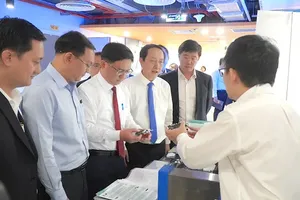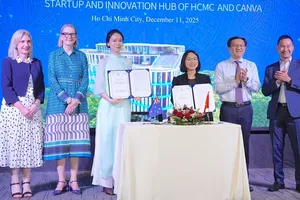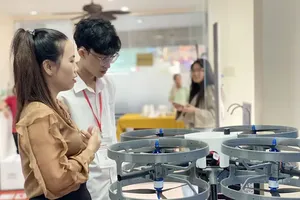AI has emerged as a cornerstone technology of the Fourth Industrial Revolution, significantly impacting the world and reshaping human life.

The recently inaugurated Center for the Fourth Industrial Revolution (C4IR) in Ho Chi Minh City is focusing on fostering research activities, developing policy proposals, and facilitating technology transfer. The center aims to establish technology ecosystems that align with the trends of the Fourth Industrial Revolution. Key areas of focus include semiconductors, biotechnology, new materials, and artificial intelligence.
CMC Technology Group and several other domestic technology groups have pledged their support to C4IR in achieving its mission and strategic objectives. Chairman Nguyen Trung Chinh of CMC Technology Group proposed an AI transformation initiative to build Ho Chi Minh City into an AI city and the world's AI center. In particular, CMC announced an AI transformation strategy to promote the development of the AI industry in many fields.
Before C4IR, Ho Chi Minh City also deployed research and development of AI applications in the 2020-2030 period with a series of programs such as building and deploying the AI Solution and Application Portal, Research and Development of AI Applications, and implementing the AI Human Resource Training Project.
The momentum behind AI adoption intensified further when President Nick Clegg of Global External Relations at Meta Technology Group (USA), unveiled Meta's commitments and plans for the Vietnamese market at Vietnam Innovation Day 2024 in Hanoi.
According to his revelation, from now until the end of the year, Meta will deploy AI virtual assistants for businesses in Vietnam, supporting interactions with customers to improve productivity. The Meta chairman believed in Vietnam's future development and cooperation with Hanoi National University in developing AI competency courses for students. The course will be run from January 2025. ‘Vietnam has the potential to become a regional power because you can take advantage of AI as a driving force for growth and effectively use digital tools’, said a Meta representative.
Discussing AI applications in Vietnam, General Director of FPT Smart Cloud Le Hong Viet highlighted that Vietnam has the potential to catch up with global AI advancements and establish a new AI industry. According to him, AI is similar to information technology which helps transform various sectors. To achieve this, Vietnam needs to develop internal AI capabilities tailored to its specific needs.
Director Le Hong Viet outlined several key steps including developing the capacity to create AI applications for Vietnamese users, collecting and managing data from the government and citizens to maintain control over their own data. Moreover, the country should build the necessary technology infrastructure to integrate AI smoothly into businesses, attracting global AI researchers and developers to create a rich resource pool.
Last but not least, the AI market should be opened in Vietnam to help businesses understand AI’s value, boost productivity, and optimize costs.
Director of Science at VinBigdata Professor Vu Ha Van added that to keep pace with the generative AI wave, Vietnam should focus on three pillars: people, resources, and tools. This includes training highly qualified human resources, encouraging and investing in generative AI research and development, and building and sharing databases to ensure national data security.
He also stressed the importance of developing a large Vietnamese language model to support generative AI solutions based on Vietnamese data, owned by Vietnamese people. Professor Vu Ha Van concluded that Vietnam has a significant opportunity for a breakthrough and should aim to create Vietnamese technology for Vietnamese people, rather than relying on foreign technology.
The National Strategy on AI Research, Development and Application to 2030, issued by the Prime Minister in January 2021, set a goal to establish AI as a pivotal technology sector in Vietnam. Moreover, by 2030, the national strategy also envisions Vietnam becoming a regional hub for AI innovation, development, and application within the ASEAN region. To realize this ambitious goal, mastering and localizing AI technology emerge as critical factors.
Through many AI-related programs organized by related agencies, all cooperate, share information, initiatives, and solutions on policy development and management as well as promote research and application of AI from domestic human resources, technology, and data sources. At the same time, governing bodies also strengthen international cooperation and learning to develop a sustainable AI ecosystem, owned by Vietnamese people in Vietnam.



